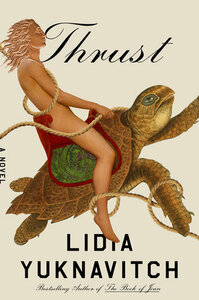You need to sign in or sign up before continuing.
Take a photo of a barcode or cover
DNF.
Simply couldn’t get into it.
Then I read the NYT review and I’m glad I dropped it.
Too many books to read. Too little time.
Simply couldn’t get into it.
Then I read the NYT review and I’m glad I dropped it.
Too many books to read. Too little time.
This was not the immigration story I expected nor the futurist fiction I'd anticipated even though it had sections set in the 2080s. It also had sections set in 1870s. So I adjusted to fantasy, to magical realism. It was intriguing to have the creation of the Statue of Liberty juxtaposed with its drowning by sea level rise. Non-linear, signaled by dates on early chapters, though the reader had to remember the dates as the scenes reappeared. The descriptive detail didn't always reinforce the time differences
Symbol. Parable. Myth. Allegory. Occasionally dipping into didacticism, but mostly enchanting narration of various stories, not the usual stories surrounding events. Sometimes disorienting in their differences. Poetry.
Above all a feeling that there is more here to be surfaced on future readings.
Symbol. Parable. Myth. Allegory. Occasionally dipping into didacticism, but mostly enchanting narration of various stories, not the usual stories surrounding events. Sometimes disorienting in their differences. Poetry.
Above all a feeling that there is more here to be surfaced on future readings.
Thoughtful, provocative and innovative. To quote from Lidia Yuknavitch's own commentary at a reading, she is more interested in history, and storytelling, as a polyphonic compendium of voices vs. single voices of "noted individuals" in history and single-speaker accounts in prose. To that extent, she constructs a complicated world that deploys dozens of characters and spans a couple of centuries as it explores past and future lives touched by The Statue of Liberty and impacted (or in some cases destroyed) by the American project. A complicated and memorable novel.
Wtf did I just read.
I don’t know if I’m supposed to believe that this was real, or it was Liza/Laisve/“water girl’s” made up reality or if it’s a mix of both. Is it parallel time travel universes? Is she her own grandmother?
I’m just…sort of lost and not in a good way.
The writing did nothing to help me connect the stories together. I wasn’t able to find common threads to grounds me to anything meaningful. Some readers got “deeper” meanings and idealistic themes out of the characters. I don’t know if I didn’t read this right or what?! And then the talking earthworms. And the axolotl that grows limbs of you eat it under water.
I am going to stop now.
I don’t know if I’m supposed to believe that this was real, or it was Liza/Laisve/“water girl’s” made up reality or if it’s a mix of both. Is it parallel time travel universes? Is she her own grandmother?
I’m just…sort of lost and not in a good way.
The writing did nothing to help me connect the stories together. I wasn’t able to find common threads to grounds me to anything meaningful. Some readers got “deeper” meanings and idealistic themes out of the characters. I don’t know if I didn’t read this right or what?! And then the talking earthworms. And the axolotl that grows limbs of you eat it under water.
I am going to stop now.
As much as I believed I wasn't enjoying this while reading it, in the end, it made me smile. I realized that i was very intrigued even if at times, there were some aspects or parts of the novel that I didn't enjoy as much as others. i think what made me enjoy this book was its message and overall creativity. What are we without history? What are we without the earth? Nothing.
This was my first novel by this author. From the moment I saw this book, I knew I wanted to read it, it sounded so interesting. Its not what i expected but i do not regret reading it. It taught me things and reminded me of what we came from. Oh, how I wish we lived in a world without power, corruption and money.
it was super interesting, i'm not sure if i'd recommend it to everyone but it was definitely a unique read and I say read whatever you feel a pull towards. i really liked the characters, the story and the overall message. the writing captured my attention right away, it was really beautifully written. what i really didn't like though was the structure. it made the book harder to read and to follow which is why i'm not sure if i'd recommend reading it.
This was my first novel by this author. From the moment I saw this book, I knew I wanted to read it, it sounded so interesting. Its not what i expected but i do not regret reading it. It taught me things and reminded me of what we came from. Oh, how I wish we lived in a world without power, corruption and money.
it was super interesting, i'm not sure if i'd recommend it to everyone but it was definitely a unique read and I say read whatever you feel a pull towards. i really liked the characters, the story and the overall message. the writing captured my attention right away, it was really beautifully written. what i really didn't like though was the structure. it made the book harder to read and to follow which is why i'm not sure if i'd recommend reading it.
I'm intrigued by books that mess with time and this one messed with time in a novel way for me. You get a kaleidoscope view of time and you're made to let go of certain understandings. Filled with wisdom from characters about sexism, the atrocity of climate change, colonialism, etc... I LOVE parts where nature and animals talk despairingly about humans, which is my favorite things about many books -we ought to be put in our places. Filled with a decent amount of sexual kinks, the book made me realize that I may be more prude than I thought (love when a book reveals to me something else)
Some of my top quotes are:
"if I can only exist as some dim object, inside an insipid story laid out for me before I was born by morons who need the stories of mothers and whores to keep the social house in order…then at the very least I am going to require my own fucking pen"
"Remember you can’t save anyone. Not me, not your brother, not your father, not the world. You can only move objects and people and stories around in time. Rearrangments. Like rebuilding meaning from falling-apart pieces"
Some of my top quotes are:
"if I can only exist as some dim object, inside an insipid story laid out for me before I was born by morons who need the stories of mothers and whores to keep the social house in order…then at the very least I am going to require my own fucking pen"
"Remember you can’t save anyone. Not me, not your brother, not your father, not the world. You can only move objects and people and stories around in time. Rearrangments. Like rebuilding meaning from falling-apart pieces"
It's really hard to talk about this book in any kind of linear way, because it is such a beautiful, brilliant, timeline jumping, hologram of a book. I recently watched the author's TED Talk "The Beauty of Being a Misfit" and I highly recommend watching this 12 minute video before/during/after reading this book. This is a book about misfits - those that do not fit into the "straight world," yet are world-building and transforming with their unique visions and actions. Lidia Yuknavitch's writing released a valve I did not realized I had closed in me - she opened up my heart into the vastness of what is possible when I allow my most authentic words and ideas to spill out of me. This book is a true gift to the world.
challenging
dark
emotional
hopeful
informative
inspiring
mysterious
reflective
sad
slow-paced
Plot or Character Driven:
Character
Strong character development:
Complicated
Loveable characters:
Yes
Diverse cast of characters:
Yes
Flaws of characters a main focus:
No
I think Lidia Yuknavitch is brilliant. I’ve read two of her books and have been left exhausted by the time I reach the final page. I love the way her mind works even if I don’t always understand it.
Thrust does not have a straightforward narrative, in fact one of its main themes is the myth of chronology. (Ok in reading this over for errors I just realized her memoir has that very word in the title in an ironic manner). Just as Yuknavitch deconstructs and reconstructs time and place, she does the same to the body. She writes a lot about water, something that cannot be broken into pieces, and it’s only fitting that while reading this novel, I had to make myself relax as though floating on water, something I’m not usually comfortable doing. Once I reacclimatized myself to her writing (her memoir is one of my very favorites), I was able to let her words carry me as I bobbed along.
Above all, Yuknavitch is compassionate. Her aim seems to me to be to not so much make connections as illuminate them. Thrust is full of relatively obscure history that she ties into the narrative. I was reminded a bit of another writer I love, Rebecca Solnit. They’re two very different writers, Solnit being a lot more, well, structured I suppose, but are both superb at incorporating many facets of history and humanity seamlessly into their writing. Thrust is not for everyone, but it is the kind of unique book that I already know to whom I will recommend it.
Thrust does not have a straightforward narrative, in fact one of its main themes is the myth of chronology. (Ok in reading this over for errors I just realized her memoir has that very word in the title in an ironic manner). Just as Yuknavitch deconstructs and reconstructs time and place, she does the same to the body. She writes a lot about water, something that cannot be broken into pieces, and it’s only fitting that while reading this novel, I had to make myself relax as though floating on water, something I’m not usually comfortable doing. Once I reacclimatized myself to her writing (her memoir is one of my very favorites), I was able to let her words carry me as I bobbed along.
Above all, Yuknavitch is compassionate. Her aim seems to me to be to not so much make connections as illuminate them. Thrust is full of relatively obscure history that she ties into the narrative. I was reminded a bit of another writer I love, Rebecca Solnit. They’re two very different writers, Solnit being a lot more, well, structured I suppose, but are both superb at incorporating many facets of history and humanity seamlessly into their writing. Thrust is not for everyone, but it is the kind of unique book that I already know to whom I will recommend it.





